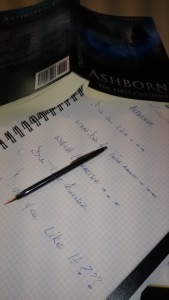
If you’ve already self-published (or plan to self-publish) a novel, you’ve probably heard of a thing called beta readers. Beta readers are those wonderful readers who get a chance to read your novel before it goes to the masses and tell you what they think about it. Yay!
Since the dawn of self-publishing, different folks have had different ideas of what a beta reader is. Some authors expect the reader to go through line by line and note every inconsistency (just so we’re clear, that’s part of a developmental edit, not a beta read, and can be entrusted to a beta reader, or entrusted to someone who does it for a living, it’s a personal call). Others want the reader to tell them the story is great! (We all secretly want that)
Some authors want someone who could be called their ideal reader to beta read their novel. They don’t want another author to read their book, they want a reader to read their book. Makes sense. Whatever feedback the reader provides is close to any feedback the general public provides. Of course, the spectrum of readers out there is as wide as the Sahara Desert, but I can definitely see the benefits of this strategy. Let’s face it, sometimes, as authors, we can complicate the heck out of things. Having a reader involved might be just what we need. We’re getting general feedback, though.
They might say things like:
- I loved the scene where Jack and Jill fall down the hill!
- I didn’t like Robin. He’s too perfect. Does he ever make a mistake?
- What happened to Penny? She disappears halfway through the novel!
- The relationship between Sonny and Violet isn’t believable. They meet and before the first page is over they suddenly can’t live without each other.
Some authors exchange beta reading with each other. In these situations, both authors/readers know the craft. They can give more detailed feedback and discuss inciting incidents, plot points, in-depth analysis of the finer elements of dialogue and symbolism in a way the ideal reader might not.
Some authors refuse to exchange services. They argue they’re obligated to provide positive feedback because the other person is evaluating their work. By the same regard, they question the validity of the feedback provided to them. Glowing praise makes us feel great, but if we’re only receiving it because the reader wants something in return, it’s worthless. It doesn’t help anyone in the long run.
Whether you go with a reader or an author as a beta reader determines the level of feedback you’ll receive. If you expect one thing and your reader provides you with something else, it can complicate things. Hopefully, we’re all adults and can work through any misunderstandings, but I like to take as many steps as possible to avoid those situations in the first place.
Here’s my take on it:
1) I do not exchange services with other authors. I will beta read for others, but I don’t do it in exchange for a beta read of my own work, instead I charge a small flat fee. Feedback in ‘exchange’ situations could be called into question. That’s my personal opinion, though. If this type of situation works for you, great! Each author must go with what works for them and don’t let anyone (including me) tell you otherwise.
2) To prevent any misunderstandings about expectations, I’ve created my own beta-reading worksheet. I’ve tried to use yes or no questions, while still allowing for the opportunity to provide details. It took a while to get to this point. My first worksheets were simple things. I asked maybe five questions. Now I ask a few more, but I’ve tried to keep them fairly simple. The best thing about this worksheet is if I send my novel to general readers, they don’t feel compelled to give me a detailed analysis. I don’t ask them questions about character arcs or other technical aspects and I try not to use literary terms or special lingo. I don’t want to scare my readers away, after all. If I do end up sending my novel to someone who knows the craft, they can give me as much information as they feel compelled to.
I’ve tried to create one form I can use for any reader, because any feedback helps my work. I’ll gladly accept it from both readers and authors. Occasionally the general reader might leave some answers blank and that’s okay. He or she took time out of a busy schedule to give what they can. I don’t know about you, but that’s good enough for me.
In case you’re interested to see what I came up with, I’ve attached the worksheet below. Feel free to use it for your own purposes.
betareadingworksheet
I use this form myself whenever I beta read for others. I can be critical, but I always try to point out the positives in any piece of work. In the Final Thoughts area at the end, I also summarize all the author’s strong points. Authors are a sensitive bunch. We put our heart and soul on the page. Then, because we think it will be fun to torture ourselves, we give that page filled with our precious words to someone else to critique. With bated breath, we await the ‘constructive criticism’. We know the manuscript may need work and we want honest feedback. But knowing that doesn’t erase our vulnerability and those critical comments are going to hurt. So it’s always good to end on a high note, right?
Cheers!
Thanks, Aileen!
Cas, great resource! Thanks for sharing.
Reblogged this on Mindocr’s Weblog.
Thanks for the reblog. Hope it comes in handy for your readers.